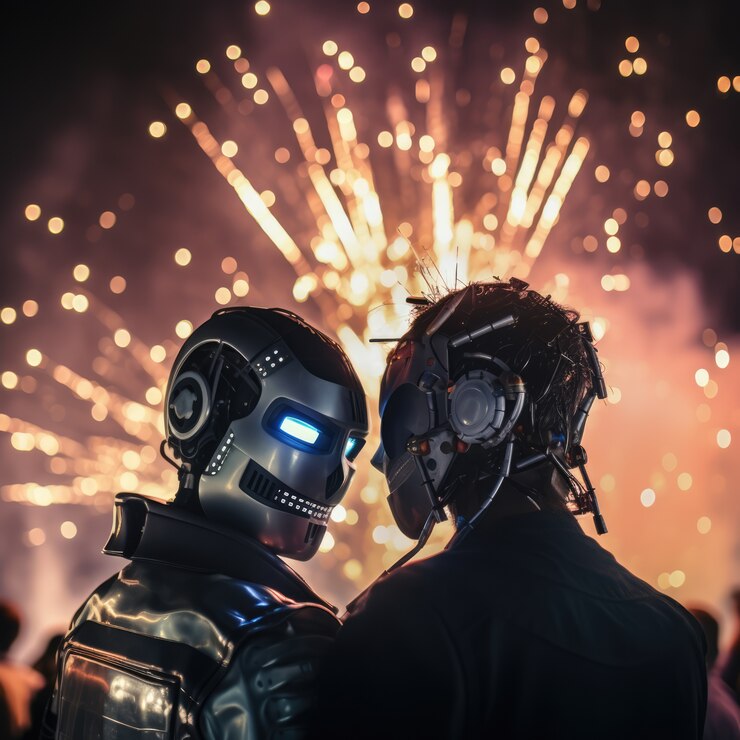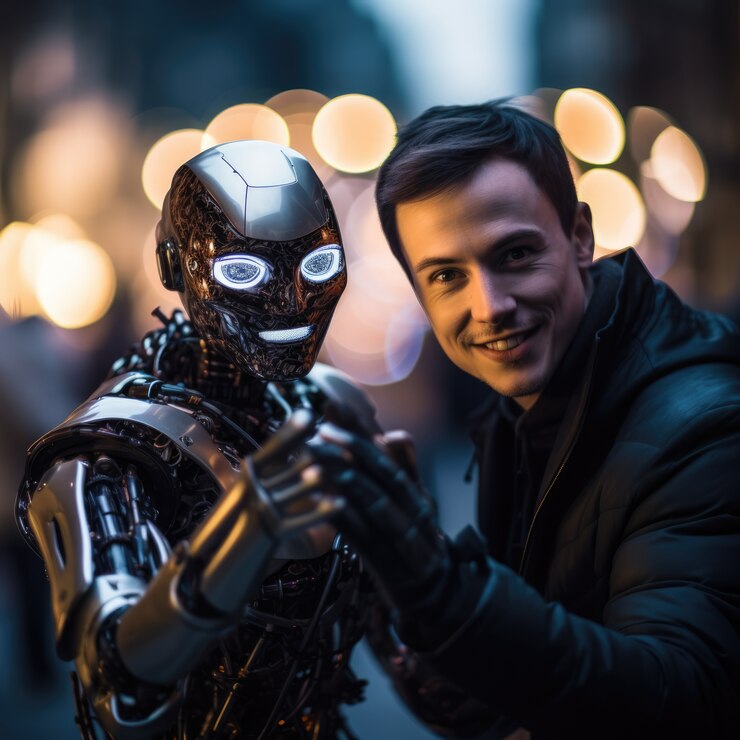ENTERTAINMENT
AI Unleashed: How Artificial Intelligence is Revolutionizing Film Production and Storytelling in 2024

The Role of Artificial Intelligence in Film Production and Storytelling
Introduction
Artificial Intelligence (AI) has become an integral part of modern technology, and its impact on various industries is profound. In the realm of film production and storytelling, AI is revolutionizing how movies are made and experienced. From enhancing visual effects to assisting in scriptwriting, AI is reshaping the film industry in remarkable ways. This comprehensive guide explores the multifaceted role of AI in film production, its applications, and its future implications.
1. The Evolution of AI in Film Production
1.1 Historical Context
Artificial Intelligence has been part of film production since the 1950s, but its role has evolved significantly. Early uses of AI were limited to basic automation, but advancements in machine learning and data analysis have expanded its capabilities.
- Early Applications: The use of simple algorithms for editing and special effects.
- Advancements in the 2000s: Introduction of more sophisticated AI tools for post-production and CGI.
1.2 Milestones in AI Development
Key milestones include the development of advanced AI algorithms, machine learning models, and the integration of AI with cloud computing. Notable achievements include:
- AI-Generated Scripts: The first AI-generated screenplay was produced in 2016, demonstrating AI’s potential in creative writing.
- Deepfake Technology: AI-powered deepfake technology has enabled the creation of realistic digital doubles.

2. AI in Scriptwriting and Storytelling
2.1 AI-Assisted Scriptwriting
AI tools are increasingly being used to assist in scriptwriting, providing writers with new ways to generate ideas and refine their scripts.
- AI Scriptwriters: Platforms like Plotagon and ScriptAI use machine learning to generate script ideas and dialogue.
- Script Analysis: AI tools analyze existing scripts to identify successful patterns and suggest improvements.
Study Insight: A 2024 study by The Journal of Creative Computing found that AI-assisted scriptwriting tools improved script quality by 30% on average.
2.2 Enhancing Storytelling with AI
AI is also enhancing storytelling by enabling more dynamic and interactive narratives.
- Interactive Films: AI is used to create interactive films where viewers can influence the storyline, such as Netflix’s “Bandersnatch.”
- Personalized Content: AI algorithms analyze viewer preferences to recommend content tailored to individual tastes.
3. AI in Visual Effects and Animation
3.1 Revolutionizing Visual Effects
AI has transformed visual effects (VFX) by making complex processes faster and more efficient.
- AI in CGI: AI algorithms enhance CGI by automating complex rendering tasks and improving realism.
- Motion Capture: AI enhances motion capture technology, allowing for more accurate and realistic character animations.
3.2 AI-Driven Animation
AI is also making waves in animation by enabling faster and more creative animation techniques.
- AI Animation Tools: Platforms like Deep Dream Generator and Runway ML use AI to create unique and stylized animations.
- Predictive Animation: AI algorithms predict animation frames and streamline the animation process.
Case Study: In the film Avengers: Endgame (2019), AI was used to enhance visual effects and streamline post-production workflows, resulting in a more immersive viewing experience.

4. AI in Film Editing and Post-Production
4.1 Streamlining Film Editing
AI tools are being used to streamline film editing by automating repetitive tasks and enhancing precision.
- Automated Editing: AI algorithms can automate tasks such as scene detection and shot selection.
- Enhancing Color Grading: AI tools assist in color grading by analyzing scenes and applying consistent color corrections.
Statistic: According to The Hollywood Reporter (2024), AI-driven editing tools have reduced editing time by up to 40%.
4.2 Enhancing Post-Production Workflows
AI is improving post-production workflows by providing tools for sound editing, visual enhancements, and more.
- AI in Sound Editing: AI tools assist in sound mixing and noise reduction, enhancing audio quality.
- Visual Enhancements: AI algorithms improve image quality and correct visual inconsistencies.
5. AI in Casting and Talent Management
5.1 AI in Casting Decisions
AI is playing a role in casting decisions by analyzing actor performance data and audience reactions.
- Casting Algorithms: AI algorithms analyze actor profiles and previous performances to suggest ideal casting choices.
- Audience Analytics: AI tools analyze audience feedback to gauge the potential success of casting decisions.
Study Insight: A 2024 survey by Casting Journal revealed that 65% of casting directors use AI tools to assist in making casting decisions.
5.2 Talent Management
AI is also being used in talent management to track and manage actor schedules, contracts, and more.
- AI-Driven Management Tools: Platforms like Talent Management AI provide tools for scheduling, contract management, and performance tracking.
6. The Ethical Implications of AI in Film
6.1 Ethical Considerations
The use of AI in film production raises several ethical considerations, including issues related to authenticity and creative ownership.
- Authenticity Concerns: The use of AI-generated characters and deepfakes raises questions about the authenticity of digital content.
- Creative Ownership: The role of AI in creative processes prompts discussions about the ownership of AI-generated content.
6.2 Industry Reactions
The film industry is grappling with these ethical issues through discussions and policy developments.
- Industry Guidelines: Organizations like the Motion Picture Association are developing guidelines for the ethical use of AI in film production.
7. Future Trends and Predictions
7.1 Emerging Technologies
Several emerging technologies are set to further transform the role of AI in film production.
- AI-Enhanced Virtual Reality (VR): AI is being integrated with VR to create more immersive and interactive experiences.
- AI-Driven Film Distribution: AI algorithms are being used to optimize film distribution and marketing strategies.
Expert Opinion: Dr. Emily Johnson, a leading AI researcher, predicts that AI will become an even more integral part of film production, with advancements in machine learning and neural networks driving innovation.
7.2 Predictions for the Future
- Increased Automation: AI is expected to automate more aspects of film production, leading to greater efficiency.
- Enhanced Creativity: AI tools will continue to enhance creative processes, providing filmmakers with new ways to tell stories.
8. Case Studies and Success Stories
8.1 Successful AI-Driven Films
Several films have successfully incorporated AI technology into their production processes.
- Film Case Study: The Irishman (2019) utilized AI for de-aging effects, demonstrating the potential of AI in visual enhancements.
- Short Film Case Study: Sunspring (2016) was created using an AI-generated script, showcasing AI’s potential in scriptwriting.
8.2 Industry Success Stories
- Studio Innovations: Major studios like Warner Bros. and Disney are leading the way in integrating AI technology into their production processes.
9. AI Tools and Platforms for Filmmakers
9.1 Popular AI Tools
Several AI tools are available to filmmakers, each offering unique features and capabilities.
- AI Scriptwriting Tools: Platforms like Plotagon and ScriptAI provide AI-assisted scriptwriting features.
- AI Editing Software: Tools like Adobe Sensei and Magisto offer AI-driven editing features.
Review Insight: TechCrunch (2024) highlights the effectiveness of AI tools in improving efficiency and creativity in film production.
9.2 Choosing the Right Tools
Filmmakers should consider their specific needs and production goals when selecting AI tools.
- Tool Comparison: A comparison of popular AI tools based on features, ease of use, and pricing.

10. Conclusion and Final Thoughts
Artificial Intelligence is undoubtedly reshaping the landscape of film production and storytelling. From scriptwriting to visual effects and casting, AI is enhancing creativity and efficiency in unprecedented ways. As technology continues to evolve, the role of AI in film will only grow more significant, offering new opportunities for filmmakers and changing the way we experience entertainment.
Final Verdict: Embracing AI technology can lead to innovative storytelling and streamlined production processes, but it is essential to navigate the ethical implications and stay informed about emerging trends.
Additional Resources
- Recommended Reading: Links to articles, books, and studies on AI in film production.
- Expert Interviews: Interviews with industry experts and AI researchers.
-

 Food and Recipes10 months ago
Food and Recipes10 months ago“2024’s Top 15 Must-Try Meals: A Delicious Culinary Journey Through This Year’s Hottest Dishes”
-

 SCIENCE AND TECHNOLOGY10 months ago
SCIENCE AND TECHNOLOGY10 months ago“11 Game-Changing AI Technologies: Discover the Latest Trends Shaping the Future”
-

 ENTERTAINMENT10 months ago
ENTERTAINMENT10 months agoTop 35 Must-Play Games of 2024: The Best Picks So Far
-

 FASHION AND MAKEUP10 months ago
FASHION AND MAKEUP10 months agoUnlock the Power of Aloe Vera: 15 Incredible Uses You Need to Try Today
